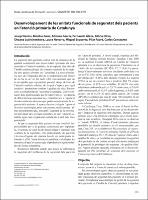Desenvolupament de les unitats funcionals de seguretat dels pacients en l’atenció primària de Catalunya
Resum
La seguretat dels pacients, entesa com la dimensió de la qualitat assistencial que busca reduir i prevenir els riscs associats a l’atenció sanitària, és un aspecte clau dins de l’àmbit assistencial que els sistemes sanitaris de la majoria dels països afronten en l’actualitat. La seva rellevància neix de l’imperatiu ètic de no-maleficència (el primer de tot ha de ser no fer mal) i del convenciment que no és acceptable que cap pacient presenti danys derivats de l’atenció sanitària rebuda, de la qual s’espera que sigui curativa i proporcioni confort i qualitat de vida. Factors com la complexitat de l’assistència sanitària, la diversificació
dels professionals que hi intervenen o l’existència de diferents fases assistencials, contribueixen a l’aparició
d’esdeveniments adversos que poden comprometre la seguretat dels pacients. A aquests factors s’afegeix l’aparició de noves tecnologies, nous tractaments, medicaments i altres procediments que, junt amb l’augment de la informació provinent dels avenços científics, fa que l’atenció sanitària sigui cada vegada més sofisticada i amb més riscs potencials.
Paraules clau
Seguretat del pacient; Qualitat assistencial; Planificació en salut
Citació recomanada
Davins-Miralles J, Gens M, García A, Álava-Cano F, Oliva-Oliva G, Lushchenkova O, et al. Desenvolupament de les unitats funcionals de seguretat dels pacients en l’atenció primària de Catalunya. Ann Med (Barc 1976). 2012;96(3):111-114.
Audiència
Professionals
Empreu aquest identificador per citar i/o enllaçar aquest document
https://hdl.handle.net/11351/3328Aquest element apareix a les col·leccions següents
- DS - Articles científics [353]
Els següents fitxers sobre la llicència estan associats a aquest element:


